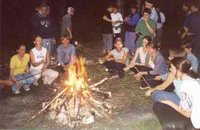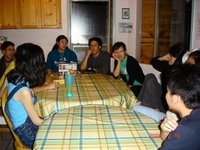Language Games – fun for the young and the not so young


The cooler weather is getting close again, and families are getting ready to go on camping trips – into the desert or along the beaches of the UAE. Of course, getting there isn’t always as much fun for children –sitting still, tied into the back seats for hours, with no room to move or do anything except sleep.
Wrong, playing games with words can provide the whole family with fun and enjoyment through the long miles, and later round the camp fire.
Games are ‘creative expressions of the human spirit through the creation of an activity that has an entertaining, instructive and competing element’ – they help with problem solving skills, language development, logical skills, creativity, social knowledge and self-esteem – and that’s all going on while Dad’s driving!
It has been said that free time is the time we should use to explore our abilities through games and have fun in educating and exercising the body and the mind; games are most definitely not a waste of time.
Here are some games for young and older alike – they are all great fun, and I defy anyone not to laugh a lot while playing any of them – go on – give them a try next time you are sitting round a camp fire or driving to get round to one.
Here’s the first game: In turns –
1st person says, “I went camping and I took a torch.”
2nd person says, “I went camping and I took a torch, and comfortable camp bed.”
3rd, 4th, 5th person adds to the list, including everyone else’s items until people start to get it all wrong – others listen out for mistakes and shout out when they hear one – the person is then out and so it continues until a winner emerges.
Here’s the second game: Leader says to first person at one end of a line, “This is a tick!”
1st in line at one end says, “A what?”
Leader says, “It’s a tick!”
1st person says to 2nd person, “This is a tick.”
2nd person says, “A what?”
1st person says to Leader, “A what?”
Leader replies, “This is a tick.”
1st person says to 2nd person, “A tick.”
2nd person says to 3rd person, “A tick.”
3rd person says, “A what?” And so on until the end of the line is reached.
You could start at both ends of the line and meet in the middle, with the first team to get there winning, or substitute other words.
Try it, it’s hilarious!!!
Here’s the third game: In turns, introduce yourself as Harry, with simple hand gestures that have to be copied.
Like this:
1st person – Hello Harry, I’m Harry. (with a simple hand gesture)
2nd person – Hello Harry, I’m Harry, meet Harry. (said to next person, + hand gestures)
Mistakes are soon made with the person making them becoming Harry One Spot/Harry Two Spot/Harry Three Spot/Harry Three Spot/Harry Three Spot with a big nose – then that person is out.
Again, this game is absolutely hilarious.
Fourth game: Just a minute ‘ talk for one minute on a given topic (Camping/Camp Fires/Swimming in the sea etc) but without:-
Deviation * (Adults explain these to younger players)
Repetition *
Hesitation *
This sounds like a grown-ups game, but children soon get right into it – watch out grown-ups or you’ll lose the subject and the game. Award points for correct challenges, remove ones for incorrect challenges, award a point to the person still talking when the minute is up.
Fifth game: Singing well known songs leaving words out and watching as others forget to omit them.
Eg. The Grand Old Duke of York/ He had ten thousand men/He marched them up to the top of the hill/And he marched them down again/And when they were UP they were UP/And when they were DOWN they were DOWN/And when they were only half way UP, they were neither UP nor DOWN.
Omitting the words UP and DOWN, singly and then together, and then singing the song including only those two words. Listen out as the Mums and Dads get it wrong, children – because they will!
Games like the ones outlined above promote turn taking skills, listening skills, aid retention of words and phrases, show children the importance of rules, promote bonding, acknowledging the other's right to be heard, enhance mental and verbal agility, let all relax and let their hair down, show the value of sharing and participating, introduce the idea of a structured activity while enhancing creativity, increase camaraderie and break down boundaries of gender, age, class, race or whatever, and above all they are all great fun.
Robert Leslie Fielding

0 Comments:
Post a Comment
Subscribe to Post Comments [Atom]
<< Home